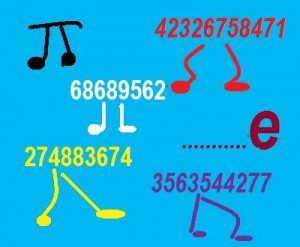Nothing Wrong with Being “Only a Number”

“Numb and number”—typical math-phobic high school student’s response to math class
After back-to-back day-long interviewing, a weary recruiter who then begins to think, “Take a number”, may be forgiven for taking his feelings of numbness about the parading applicants a step closer to total numb(er)ness: “They are numbers. Only numbers. Each and every one of them—just a number, another number. And another…”
Despite whatever self-perception as “special” any of the applicants may cultivate, the fear or feeling that it’s only wishful thinking is as understandable as it is likely to be shared. The pressing need to be “number ONE”, to be the best, which, for many job hunters, propels them onward and upward, gets crushed and mocked by the cattle-call numbers: “NUMBER one! Next!”…. “NUMBER two!”
Number Ambivalence
Ambivalent or confused must be the applicant who is told he is “number one” while shaking hands with the recruiter, much as he would feel hearing that he is “the 10,000th applicant interviewed in this office!” Is both cases, is that an achievement, a complaint or a dull fact? Is he hearing that he’s special precisely because he isn’t? That’s got to be confusing and trigger mixed feelings.
“I am a person. I have a name. I am not a number” is the reflex response and mantra of typical and numberless (in the collective, not in the individual sense of “numberless”) individualists.
Somehow, they think, having a name is “more special” than having or being a number, much as the characters in the now-classic Ray Bradbury sci-fi novel Fahrenheit 451 (and eventual movie, titled after the temperature at which paper burns) presumably felt. In that now-classic swat at totalitarian mind control, the proscription and burning of all books forced a brave few to memorize one book each and to introduce themselves accordingly and uniquely: “Hello, I’m Tale of Two Cities, by Charles Dickens”.
Your Number vs. Your Name
Indeed, being identified as a uniquely titled book does confer at least the appearance of greater individuality and specialness on the eponymous bearer of that name than would any family name. Unfortunately and perhaps counter-intuitively, our original given names do not analogously surpass, as identifiers, any number that may be assigned to us.
Being identified as “Applicant 407326”, far from depersonalizing the twitching, anxious candidate who has just been called, actually confers on her a unique identity, a 100% special identity, since, of course, no cardinal or counting number equals any other such number. What can be more special than that? “Michael, you are next.” Which Michael? There are two waiting. “Michael Jackson, you’re next.” The dead one, or the guy who just looked up?
So, clearly being “only a number” actually makes us more special than being John X or Susan Y. Equally evidently, the distaste for “being only a number” has its roots in diabolical numbering schemes such as the Dachau and Auschwitz numerical tattooing of prisoners victimized by Nazis.
The Use of Numbering, Not The Fact, Is The Problem
Truly horrible though it was and forever will be, the assignment of numbers was not the source of the inmates degradation, anxiety and loss of identity: The source was what the Nazis planned to do and did with the numbers and to the innocent, who, for the most part and like their days, were numbered.
If an applicant is assigned a number that is uniquely his or hers AND is also made to understand that the number represents the uniqueness, dignity, rights, rational obligations and opportunities of the assignee, then, like the unique book titles borne with pride by the book-people of Fahrenheit 451, the numbers assigned will be badges of honor, respect and pride.
How To Share a Unique Number
In the event that applicants change their minds about being “only a number” and the same number is coveted by more than one person, e.g., “8888”, by two Chinese applicants who think it’s a lucky number, a compromise can easily be worked out.
One of them could, for example, be called “8810 + 78” the other “4444 x 2”—unless, like most Chinese, he insists “4” is unlucky, in which case he can be called “8811 +77”, which has just as many lucky “8”s.
As is the case in the arena of politics and social justice, the challenge in the recruiting interview marathon is to find a way to reconcile the eternally competing demands of and for equality and individuality. Numbering is the answer.
Hamlet’s Query in a Digital Age
Hence, the modern job applicant’s existential poser and variant of Hamlet’s timeless query is this: “To be ‘2’, or not to be ‘2’. That is the question.”… to which the answer is “be ‘2’, if it’s not already taken.”
Otherwise, settle for “4/2”. If you are not Chinese.

